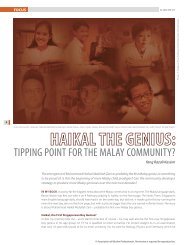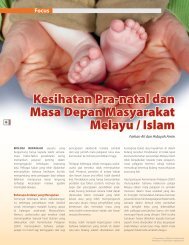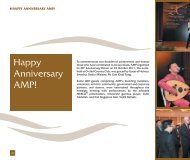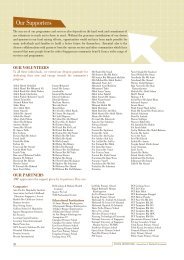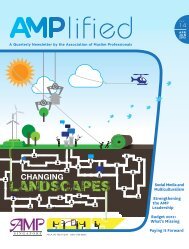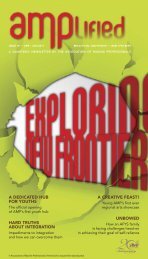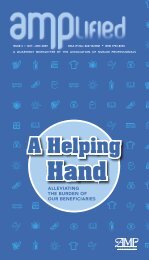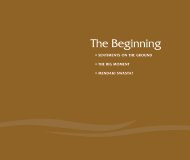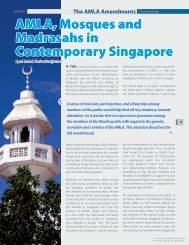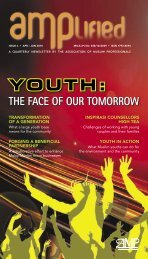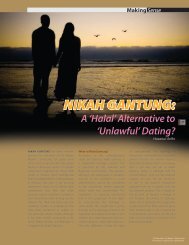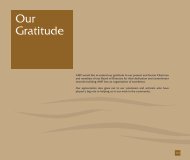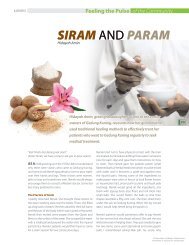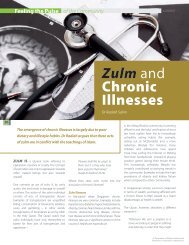community - Association of Muslim Professionals
community - Association of Muslim Professionals
community - Association of Muslim Professionals
Create successful ePaper yourself
Turn your PDF publications into a flip-book with our unique Google optimized e-Paper software.
KARYAWAN<br />
ISSUES<br />
agency to study JI’s ideology and provide an expert resource panel<br />
to assist the government and <strong>community</strong> towards understanding<br />
Islam in relation to any misconceptions and misinterpretations <strong>of</strong><br />
the religion.<br />
There is no doubt that the counselling <strong>of</strong> the JI detainees is a longterm<br />
process that requires time and perseverance. Today, while the<br />
counselling efforts are still ongoing, RRG has broadened its activities<br />
to include educational and social programmes. These programmes<br />
aim to proactively educate the wider public on the dangers <strong>of</strong><br />
extremist ideologies and prevent <strong>Muslim</strong> youth from being drawn<br />
into deviant teachings.<br />
Challenges in Rehabilitation<br />
Although the asatizah <strong>of</strong> the RRG are qualified Islamic scholars and<br />
teachers, understanding and dealing with the religious ideology <strong>of</strong><br />
JI is still a great challenge. This is particularly because JI’s worldview<br />
and their understanding and interpretation <strong>of</strong> Islamic concepts is<br />
alien to Islam and thus, it was something that the asatizah were not<br />
familiar with. On the RRG’s strategy, Ustaz Ali Haji Mohamed said that<br />
when it started the rehabilitation work, it did not have any model or<br />
example to follow.<br />
He said: “This rehabilitation approach to extremists and radicals is<br />
possibly the first <strong>of</strong> its kind. Not much research has been done then.<br />
We started with an in-depth research. We went back into history,<br />
to look at the causes <strong>of</strong> extremism. We analysed and compared<br />
different patterns <strong>of</strong> extremism and radicalism. We returned to our<br />
revered sources and our Islamic intellectual tradition and heritage.”<br />
He also revealed the engagement <strong>of</strong> ulama or religious scholars<br />
to gain their support. “We engaged our ulama and dwelled on the<br />
need to open the gates <strong>of</strong> ijtihad (reasoning) specifically on this<br />
issue <strong>of</strong> terrorism and radicalism. Simply put, all RRG members had<br />
to become ‘students’ again.”<br />
To ensure a smooth and effective counselling session for the JI<br />
detainees, the RRG needed to conduct research on the Islamic<br />
concept misconstrued by Islamist militants in general and JI’s<br />
ideology in particular. This research effort has led the RRG to produce<br />
their first counselling manual entitled “Islam Agama Salam & Damai:<br />
Langkah Hayati Erti Jihad Sebenar” (Islam, Religion <strong>of</strong> Peace: Steps<br />
Towards Understanding the True Meaning <strong>of</strong> Jihad) which is used<br />
by the asatizah as a guide in the counselling process. In 2008, RRG<br />
produced its second counselling manual which consists <strong>of</strong> broader<br />
and current issues, like the threat <strong>of</strong> self-radicalisation and religious<br />
extremism to name a few.<br />
In counselling the JI detainees, RRG members, equipped with their<br />
religious knowledge, voluntarily provided their time to sit and talk with<br />
the JI members. Initial counselling sessions with the detainees centred<br />
Today, the concept <strong>of</strong> religious<br />
rehabilitation, particularly for Islamist<br />
militants, has gained wide acceptance<br />
locally and internationally.<br />
on explaining the correct understanding <strong>of</strong> concepts like jihad, hijrah<br />
(migration), bai’ah (pledge <strong>of</strong> allegiance), ummah (Islamic <strong>community</strong>)<br />
and daulah islamiyah (Islamic state). Apart from discussing these<br />
concepts, RRG members have a greater role to educate the detainees<br />
on the peaceful and moderate message <strong>of</strong> Islam, universal Islamic and<br />
moral values that are deemed important in order for the detainees to<br />
have a wholesome understanding <strong>of</strong> Islam.<br />
Taking the RRG Around the World<br />
Today, the concept <strong>of</strong> religious rehabilitation, particularly for Islamist<br />
militants, has gained wide acceptance locally and internationally.<br />
Singapore is not alone in this effort – similar concepts <strong>of</strong> rehabilitation<br />
can be found in countries like Saudi Arabia, Yemen, Egypt, Malaysia<br />
and Indonesia. Today, many governments have realised that religious<br />
rehabilitation is an important component to formulate a more<br />
effective counter extremism and terrorism strategy.<br />
In particular, Singapore’s approach to religious rehabilitation has<br />
gained the interest <strong>of</strong> many – including the US government. In<br />
an article published by The Christian Science Monitor on 9 October<br />
2007 Simon Montlake writes: “A counselling programme that<br />
employs <strong>Muslim</strong> clerics to rebut extremist views <strong>of</strong> detainees<br />
has steadily reduced their numbers over the past four years in<br />
Singapore, suggesting that religious-based rehabilitation may <strong>of</strong>fer<br />
an alternative to indefinite detention without trial in the US-led war<br />
on terrorism.”<br />
Due to the importance and interest in such efforts, RRG members<br />
have travelled widely to share Singapore’s approach <strong>of</strong> detainee<br />
rehabilitation with the authorities in Malaysia, Indonesia, Saudi<br />
Arabia, United Kingdom, United States, Germany, Belgium, Austria<br />
and Denmark. After six years <strong>of</strong> engagement in the rehabilitation<br />
work, today RRG has started to groom the next generation <strong>of</strong> young<br />
asatizah to continue their work.<br />
Moving forward, RRG will continue to collaborate and engage<br />
different government agencies, institutions, think tanks, academicians<br />
and religious scholars to provide information on RRG and expose the<br />
dangers <strong>of</strong> radical ideologies. It also plans to engage a wider range<br />
<strong>of</strong> the Islamic teaching <strong>community</strong> such as the asatizah in mosque,<br />
madrasahs and overseas students. New approaches will be explored,<br />
such as conventions, workshops, partnerships and sharing sessions<br />
with different levels <strong>of</strong> society, especially the youths.<br />
31<br />
Ustaz Mohamed Bin Ali is a secretariat member and counsellor <strong>of</strong> the Religious Rehabilitation Group (RRG). He is currently pursuing a PhD in Arab<br />
and Islamic Studies at the University <strong>of</strong> Exeter, United Kingdom.<br />
© <strong>Association</strong> <strong>of</strong> <strong>Muslim</strong> Pr<strong>of</strong>essionals. Permission is required for reproduction.



